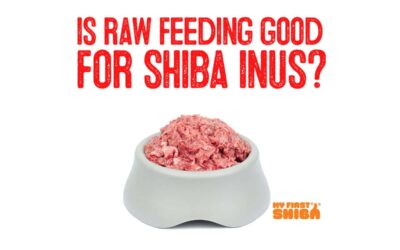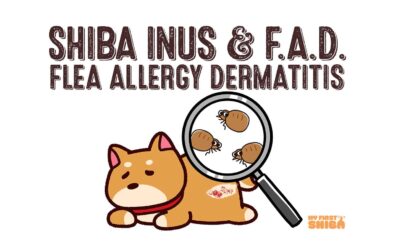On occasion, our posts contain affiliate links. However, we only recommend products that we truly believe in. For more information, visit my privacy policy page.
Shiba Inu Food Allergies
Food allergies are a common health issue of the Shiba Inu dog breed. This annoying and sometimes chronic condition causes itching, hair loss and hot spots – the most common symptoms. Additionally, food allergies can also cause chronic ear infections as well as stomach issues such as increased bowel movements.
What’s The Difference Between a Food Allergy and a Food Intolerance in Dogs?
Many dog owners don’t understand what the difference between a true food allergy and a food intolerance is. True food allergies in dogs usually always manifest as skin issues such as excessive scratching due to itchiness.
Shiba Inus with food allergies commonly have hair loss issues due to all of the scratching. The hair loss commonly occurs around the eyes, mouth, ears, armpits and legs.
On the other hand, food intolerance in dogs shows up as gastrointestinal problems such as vomiting and diarrhea. Food intolerance in dogs do not cause skin issues. However dogs with food allergies do sometimes have gastrointestinal problems along with skin problems.
 Determining If Your Shiba Inu Has A True Food Allergy
Determining If Your Shiba Inu Has A True Food Allergy
Food allergies in dogs account for roughly 10% of all allergies in dogs – meaning that 1 out of every 10 dogs who suffer from allergies have food allergies – the third leading cause of dog allergies after flea bite and atopy / inhalant allergies (dust mites, mold, pollen, etc).
These numbers suggest that food allergies are not that common in dogs. However, dogs that suffer from skin itching as the main allergic symptom, food allergies are the cause 20% of the time. These statistics show that if your Shiba Inu has excessive skin itching and hair loss due to an allergy, the chance that it is caused by a food allergy is 1 in 5 or 20%.
Many Allergies Share The Same Symptoms
Diagnosing a food allergies in dogs can be very difficult. Mainly because the symptoms of food allergies are also the same symptoms of inhalant allergies, atopy, and flea allergies. Other health issues such as a mange, yeast / bacterial infections, and intestinal parasite hypersensitivities can also cause the same symptoms as food allergies.
It is important to rule out these other conditions first before concluding that your Shiba Inu has a food allergy. Flea allergy dermatitis is a particularly commonly seen affliction in Shiba Inus. Loss of hair near the tail of your dog is a strong indication that your dog may have a flea allergy.
Once you have determined that your Shiba Inu most likely has a food allergy, you can then begin a food trial which will ultimately determine if your dog has a true food allergy and what offending foods are causing the allergy symptoms.
Confirming A Food Allergy With A Food Elimination Trial
The good news is that there is a definitive way to diagnose food allergies in dogs with a food elimination trial. The bad news is that food elimination trials do take a lot time, planning, and work. Recent scientific studies show that food elimination trials should last for three months.
Adults Only – Not For Puppies
In general, dogs under one year of age do not develop food allergies. The reason is because it takes a bit of time for the dog to begin developing a reaction to an offending food.
Food elimination trials usually are not nutritionally balanced due to the limited ingredients. This is fine for mature dogs in the short term – but not suitable for growing puppies who need all then nutrition they can get.
What Is A Food Elimination Trial?
A food elimination trial is the only way to determine if your dog has a food allergy. The trial consists of feeding your dog a novel protein that your dog has never ingested before as well as a carbohydrate that you dog has also never ate before.
What Is A Novel Protein?
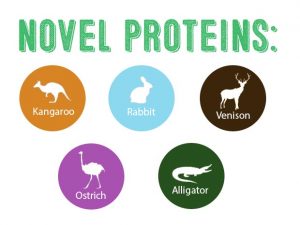
After choosing a novel protein and carbohydrate such as venison and rice, the dog must be fed ONLY this food for two to three months. Absolutely nothing else can given to your dog for the entire three months. Additionally, your dog must be closely monitored to ensure that your dog does not ingest anything in the dog’s surroundings.
Improvement After 2 – 3 Months / Food Challenge Phase
If your dog’s symptoms has improved markedly after 2 – 3 months, then a food allergy is likely to be diagnosed. You can now begin the food challenge part of the trial to find out what foods your dog is allergic to. This phase consists of introducing one new food at a time and seeing if your dog’s symptoms returns.
Allergic symptoms takes a few days to up to two weeks to appear so give the new challenge food up to two weeks before introducing a new challenge food. If the challenged food does cause your dog’s symptoms to reappear, you can be reasonably certain that your dog has a allergy or sensitivity to that food.
Continue to test other proteins and potentially carbohydrates for as long as you feel that you are gaining knowledge about what your dog can and cannot tolerate.
 No Symptom Improvement After 6 Weeks
No Symptom Improvement After 6 Weeks
If your Shiba inu does not have any improvement after six weeks, a food allergy is not likely to be the cause of your dog’s symptoms and the food elimination trial can be stopped. Instead, your dog could be suffering from allergies such as atopy, flea allergies, or another health issue unrelated to allergies.
Intradermal Skin Testing For Other Possible Allergies
On a positive note, once a food allergy possibility is eliminated, you can now check for other possible causes of your dog’s condition. It would be a good idea to take your dog to a veterinarian for a thorough consultation. If you suspect another type of allergy could be involved with your dog’s symptoms, ask your vet about conducting an intradermal skin test. This test is fairly reliable and will check to see if your dog is allergic to things such as mold, mites, grasses, and insects.
Intradermal skin test successfully identifies allergens in atopic dogs up to 75% of the time, making it a viable option for your dog if your dog’s symptoms are moderate to severe.
Some Improvement After 6 Weeks
If your Shiba Inu has just a little improvement in symptoms after six weeks, it may be worthy to continue the trial for the full three months. New studies show that only some animals respond to food trial by three weeks, but a majority of the animals in the study did respond after 3 months.
By going through with the food trial for the entire three months, you can more easily decide if your dog has or doesn’t have a food allergy.
If after Shiba Inu doesn’t show much improvement of symptoms after 12 weeks, you can reasonably assume that the issue is not food allergies.
Treating A Dog Food Allergy
If you have determined your dog does have a food allergy – congratulations on finding a successful diagnosis!
Treating a dog food allergy is as simple as it gets – avoid feeding your dog the offending food. If your dog is allergic to one or two proteins like chicken and beef, feed your your dog other proteins on a rotating schedule to ensure your dog gets a diverse diet.
Avoid feeding more than one protein at a time to ensure that your dog does not develop new reactions to the proteins too quickly.
And yes, it is possible for your dog to eventually develop an allergy to a different protein. The best practice is to stay on top of your dog’s diet and keep a journal of daily feedings. Doing most of the work in the beginning will make it easier for your Shiba Inu to stay healthy in the long term.
Treating The Symptoms Of Dog Allergies
Finding the correct diagnosis for any dog allergy can be a lengthy, frustrating, and difficult experience – tests can be inaccurate, your dog may have multiple allergies, food trials can be time consuming.
Until you find the right diagnosis, your dog may be suffering from uncomfortable symptoms such as excessive itching, hot spots, or other more serious symptoms.
It is important to take your dog to your veterinarian for consultation especially if the symptoms are moderate to severe. If an allergy is suspected, your vet may recommend tests and give your dog medicines to treat the symptoms.
Steroids / Antihistamines
Typically, veterinarians prescribe over the counter antihistamines like Benadryl or prescribe steroids such as cortisone.
Antihistamines
Anitihistamines are milder and have less side effects than steroids. Antihistamines help itching symptoms in about 30 – 40% of allergic pets. Diphenhydramine, Bendadryl is the most commonly prescribed antihistamine for dogs. Other antihistamines may or may not work better and trying them individually is the only way to determine which antihistamine works best for your dog.
Steroids
Generally speaking, because of the numerous side effects, the use of steroids should be the last line of symptom treatment for allergic dogs.
Basically, steroids should only be considered for dogs whose symptoms are moderate to severe. Steroids are available as oral medication or injections. Steroid treatment is inexpensive and work very well and very quickly. However, side effects such as increased thirst, excessive urination, weight gain, and hunger are side effects that can quickly negate the benefits of the drug.
Long term use of steroids is not recommended as the side effects become more severe. Long term steroid use can cause liver enlargement, high blood pressure, kidney disease, weak muscles / ligaments, and hair / skin issues.
Other Medications
Cyclosporin (Atopica)
Cyclosporin is a fairly new non-steroidal oral medication. This drug is helpful in up to 80% of allergic dogs suffering from excessive itching.
This medication has less side effects than steroids but at a higher monetary cost. However, it is an immunosuppresive drug and long term treatment would require regular vet check ups and testing.
After reading pages and pages of available literature on this drug, I would not recommend long term usage of this drug. Drug reports from the FDA shows that Cycloporin has an alarmingly high rate of adverse reactions. FDA PDF here.
Oclacitinib (Apoquel)
Oclacitinib is the newest allergy medicine on the market. It has been shown to be very successful in the treatment of dog allergies and atopy. The cost of this drug is high compared to other treatment options. The short term side effects of this drug is minimal and may include nausea and vomiting.
However, though the short term effects of this drug is minimal, the long term effects are unknown. A concerning fact about the mechanism of this drug is that is involves interrupting kinases which are basically signaling compounds that helps cells communicate with each other.
So while Apoquel is highly effective in interrupting the specific kinase that is responsible for your dog’s allergic itching symptoms, it also interrupts other immune functions that could have grave effects on your animal in the long term.
 Holistic Approaches To Treating And Managing Your Dog’s Allergies
Holistic Approaches To Treating And Managing Your Dog’s Allergies
Ideally, most dog parents would prefer to treat their dog’s allergy symptoms as naturally as possible. Holistic care, can in many cases be used to address your dog’s allergy symptoms either by itself or in conjunction with conventional veterinary care.
Typically, when it comes to dog’s allergies, conventional veterinary medicine addresses mostly the symptoms of the allergy. For example, pharmaceuticals to treat your dog’s excessive itching mainly “turn off” the itching mechanism by either blocking the messaging pathways or suppressing the immune system to allow the allergen to “get by”.
Holistic approaches on the other hand aim to get to the root of this issue and heal it naturally with the use of natural herbs and the bodies own immune system.
Both holistic and conventional approaches are sometimes needed to remedy your dog’s allergy problems. You, as a concerned dog parent, should learn as much as possible about each approach so that you can make the wisest decisions regarding your dog’s care.
Ditching The Kibble
By far, one of the best things you can do for your dog’s long term health and well being is to feed him or her a quality, fresh, whole food diet. In fact, many cases of atopic dogs have been successfully resolved simply by changing the dog’s diet.
Out of all of the hundreds of varieties of commercial dog food available one the market, I would only “maybe” consider feeding my dog 5% of them. Otherwise I prepare my own dog’s food with fresh, human grade ingredients – not low quality, fortified, roadkill “cereal”.
Try taking small steps to improve your dog’s diet by adding fresh proteins and vegetables into your dog’s daily kibble. Transitioning into a fresh human grade diet is not as hard as you think it is. There are multitudes of resources to help ensure that you are providing your dog a balanced diet.

Additionally, healthier dogs means much less vet visits and hospitalization costs in the long run. We all know that veterinarian hospital bills are simply dreadful.
DCSIR, a Washington State Shiba Inu Rescue feeds all if it’s rescued dogs a 100% raw diet with natural supplements such as digestives and probiotics.
Many of the Shiba Inus enter the rescue with such severe skin allergies that the owner no longer could afford to treat with veterinarian visits and pharmaceuticals.
Within months, so far all of the allergic dogs that entered DCSIR have transformed amazingly into healthy dogs with beautiful coats and resolved allergy symptoms. While this is not a rigorous, regimented scientific study, the results are just too amazing to ignore. Read more about DCSIR’s raw food program here.
Strengthen Your Dog’s “Guts” To Enhance Natural Immunity
Did you know that just like humans, a large portion of your dog’s immunity is located inside of walls of the lining of it’s guts? Holistic veterinarians and practitioners have long been known to promote the benefits of having a healthy and balanced gut environment to naturally create an enhanced immune system. An enhanced immune system can readily deal with allergies naturally without dangerous long term usage of pharmaceuticals.
How Can I Strengthen My Dog’s Gut Environment?
In addition to omega-3 fatty acid supplementation, probiotics, prebiotics, and vitamins / minerals such as tumeric and Biotin can all aid in strengthening your dog’s immune system. It is important to take the time to learn as much as you can about each supplement to ensure your dog gets the correct dosage.
Natural supplementation is just one piece of a large, holistic puzzle. Each piece works synergistically with the other pieces to form a happy and healthy dog. Unlike western medicine, holistic approaches work slowly and need time to address the root issues of various maladies.
It is important to know when holistic treatments can be used as the exclusive program for your dog’s allergy symptoms or when it can be used as a supplementary program that is used along with conventional veterinarian therapy. Moderate to severe cases of atopic dogs should be tended to by a veterinarian and conventional pharmaceuticals must be used in certain cases.
Essential Fatty Acid Supplementation:
Research has proven that essential omega-3 fatty acids are beneficial to healthy skin in dogs and cats. There are virtually no dangerous side effects except for possible stomach upset in very high doses. The benefits of this supplementation does take a long time to materialize and not all dogs respond to it, but it is still recommended as an overall component of your dog’s allergy management program.
Probiotics And Prebiotics
Probiotics are essential for balancing your dog’s gut flora with good bacteria. If there is too much bad bacteria in your dog’s gut, the bacterial imbalance can lead to host of health issues including allergies.
Antibiotics, steroids, and low quality diets all contribute to the imbalance of gut flora by killing the good bacteria in your dog’s intestines. Stress and anxiety can also cause an imbalance in your dog’s gut flora.
Probiotics are great natural way to restore your dog’s natural immune functions that will your dog closer to optimal health and well being.
Prebiotics are a source of nutrients for probiotics. Prebiotics help probiotics thrive so it is essential to use both as part of your dog’s wellness plan.
Digestive Enzymes
Humans have been using digestive enzymes for a long time to improve digestion and overall health. These enzymes also are beneficial to dogs as well. Digestive Enzymes helps to break down nutrients for better absorption and digestion.
Natural Supplements
Spirulina – Spirulina is a noted “superfood” that has proven in many clinical studies to improve the immune system, gastrointestinal health, and kidney toxicity.
Quercetin – Quercetin is a powerful flavanoid that provides anti-inflammatory effects as well as anti-histamine characteristics. This supplement is considered to be safe with no major side effects apart from gastric upset in rare cases.
Other Supplements Worth Considering – Milk thistle, biotin, gamma-linolenic acid (GLA)
Resources: http://veterinarymedicine.dvm360.com/it-s-not-magic-skinny-treating-canine-atopic-dermatitishttp://www.peteducation.com/article.cfm?c=2+1587&aid=503http://www.dermatologyforanimals.com/faq-03/http://www.whole-dog-journal.com/issues/7_8/features/Canine-Allergies_15640-1.htmlhttp://www.akc.org/content/health/articles/probiotics-for-dogs/http://jn.nutrition.org/content/137/3/830S.fullhttp://products.mercola.com/healthypets/digestive-enzymes-for-pet/http://www.dogsnaturallymagazine.com/benefits-of-spirulina/http://www.veterinaryplace.com/dog-medicine/quercetin-for-dogs/
New Shiba Inu Puppy! Meet Zuka!
Everything you need to know about how to get in touch with reputable Shiba Inu breeders in Japan
How To Care For Your Sick Shiba Inu
On occasion, our posts contain affiliate links. However, we only recommend products that we truly believe in. For more information, visit my privacy policy page.Author: Jennifer TsukamotoIllness and pain is one of the unfortunate realities of our earthly...
Is a Raw Diet Good For Your Shiba Inu?
On occasion, our posts contain affiliate links. However, we only recommend products that we truly believe in. For more information, visit my privacy policy page.Author: Jennifer TsukamotoShould you feed your Shiba Inu a raw diet?And if so - why, and how?In this...
Are Fermented Foods Good For Your Shiba Inu?
On occasion, our posts contain affiliate links. However, we only recommend products that we truly believe in. For more information, visit my privacy policy page.Author: Jennifer TsukamotoAs devoted Shiba Inu owners, we're always on the lookout for ways to enhance...
Flea Allergy Dermatitis in Shiba Inus
On occasion, our posts contain affiliate links. However, we only recommend products that we truly believe in. For more information, visit my privacy policy page.Author: Carla Germano, DVMFleas are a very common problem and can make any dog itchy and scratchy!In...
Heart Murmurs in Shiba Inus
On occasion, our posts contain affiliate links. However, we only recommend products that we truly believe in. For more information, visit my privacy policy page.By: By Rhiannon Koehler, DVM, MPHLub-dub. Lub-dub. Lub-dub.This is the way a normal heartbeat in a dog...
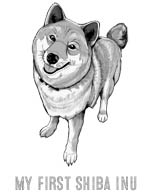
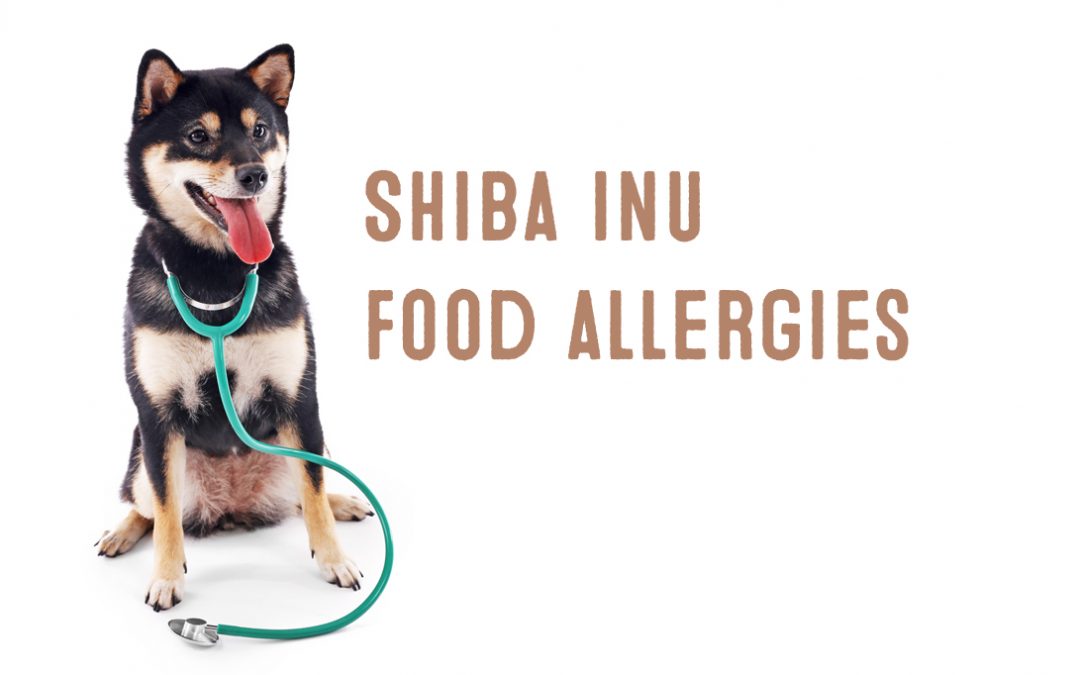
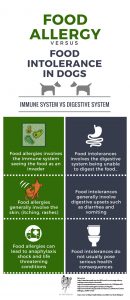 Determining If Your Shiba Inu Has A True Food Allergy
Determining If Your Shiba Inu Has A True Food Allergy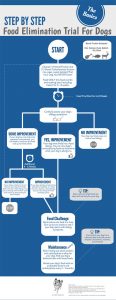 No Symptom Improvement After 6 Weeks
No Symptom Improvement After 6 Weeks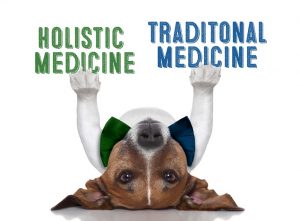 Holistic Approaches To Treating And Managing Your Dog’s Allergies
Holistic Approaches To Treating And Managing Your Dog’s Allergies

